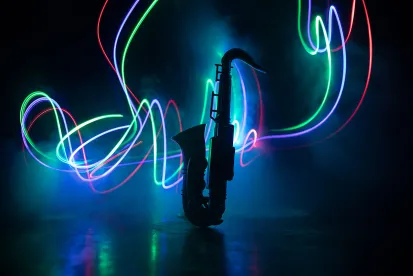Just like Napster triggered a global, technological shift in the way music is consumed and distributed, we are now on the precipice of another major revolution certain to disrupt the music industry. Artificial intelligence, or “AI” as it is more commonly referred, has quickly emerged as a game changer across a myriad of industries and music is no exception. AI offers the promise of innovative opportunities and avenues for music creation, publishing, recording, synchronization, distribution, consumption and revenue generation. However, these opportunities also present significant, novel challenges for music rights holders and users alike—and the legal challenges have just begun.
AI is not a new concept. Digital music service providers and platforms have been using machine learning for years to, among other things, personalize playlists and make recommendations for their users based on listening history, detect copyright infringement and automate aspects of music editing and production. However, over the past several years, AI has grown smarter, more accurate and efficient by leveraging its access to massive datasets and immense computing power. As a result, music recommendation and search capability has significantly improved. Established and emerging artists can benefit from these acute recommendation systems that suggest new artists and songs to listeners based on their past musical selections and music genre preferences. Songwriters can use AI to overcome writer’s block, simulate voices or create new sounds previously impossible to create with instruments. AI tools can also assist labels and publishers in the identification of new talent by analyzing patterns and learnings from prior music that went viral or artists that achieved success. Investment in these technologies by top labels is indicative of their potential to streamline and improve the artist discovery process, as well as the possibility for increased transparency in rights allocation and revenue tracking.
The application of AI is going even further, however, to actually enable the creation of new music based on pre-existing songs, which raises a host of legal issues relating to the ownership of such AI output, and whether the data from which the AI platform was trained amounts to infringement (or depending on the manner in which the AI gathers or scrapes information, violates the Computer Fraud and Abuse Act or third party websites’ terms of use). In response to the rapid increase in the use of generative AI, the U.S. Copyright Office (USCO) has recently announced a new initiative to examine the copyright law and policy issues raised by AI, including the scope of copyright protection afforded to works generated using AI tools and the permitted use of copyrighted materials in AI training. The USCO is also issuing new registration guidance that requires applicants to disclose the inclusion of AI-generated content in works submitted for copyright registration. Until more definitive guidance is issued by the USCO, issues of ownership and infringement will likely be determined in the courts.
Similar to the copyright challenges Napster faced in the early 2000’s, rights holders have already started filing lawsuits against platforms that provide AI generated art and the applicability of existing legal precedent is uncertain. While the Copyright Office has declined protection for purely AI generated works and solidified that authors must be humans, what remains unclear is (1) how much human intervention or contribution is required to render AI generated materials copyrightable and (2) assuming the output is protectable, who is the rightful owner? From the perspective of music rights holders, the ingestion and learning by AI tools based on existing music may infringe upon the copyright owner’s exclusive rights to reproduce their works and create derivative works—accordingly, any usage of music for AI training would require a license from the owner of the applicable work. If the law adopts this perspective, licensing of music as training data for AI systems will present another potentially lucrative revenue stream for music rights holders. Owners of large catalogs of music, including private equity investors, may consider licensing compositions or masters specifically for use in the training and refinement of AI algorithms. However, whether the AI generated works will be deemed transformative enough to fall within the fair use exception, and therefore negate the license requirement, remains to be seen. While it may be some time before purely AI generated music is competing with human artists for chart-topping hits, the legal hits are sure to keep coming.
The legal complexities surrounding the use of AI in the music industry will undoubtedly continue to rapidly evolve.




 />i
/>i
